IR
-
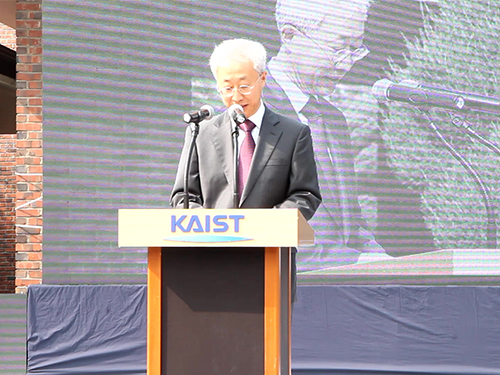 KAIST's Graduate School of Culture Technology Celebrates Its Tenth Anniversary
The Graduate School of Culture Technology (GSCT) at KAIST hosted a ceremony and a variety of events to celebrate its tenth anniversary on October 22, 2015, on campus.
Established in 2005 with the support of the Ministry of Culture, Sports and Tourism of the Republic of Korea, GSCT offers an intensive, in-depth education in culture technology, an interdisciplinary field first introduced in Korea by KAIST, which brings arts, humanities, science, and technology together in an academic and research arena.
Over the years, the graduate school has fostered top-notch researchers and professionals who have played a leading role in the development of a Korean culture contents industry that includes movies, broadcasting programs, music, games, and culture events.
After the anniversary ceremony, GSCT held a "Demo Day" to showcase its major research projects. A total of 41 projects were presented under the themes of “Art and Science,” “Human and Humane,” and “Virtual Reality vs Reality.”
In addition, there was a seminar held on GSTC’s ten-year accomplishment and future planning with the school’s Professors Sunghee Lee, Juyong Park, and Juhan Nam; a cultural event for the public called the “Talk Concert,” which included many professionals in culture industry and academia to share ideas and views; and the Homecoming Day for GSTC graduates. So far, the graduate school has produced 295 masters and 34 doctors. About 34% of its graduates are employed in the movie, game, and broadcasting sectors, 33% in the social networking service and Internet industry, and 33% in performing art and exhibition and event.
Dong-Man Lee, the Dean of KAIST's Graduate School of Culture Technology, said,
“We will continue to develop our school to lead the advancement of the Korean culture industry, contributing to the growth of Korean Wave, the popularity of Korean culture, in the global community.”
In the picture below, Dean Lee delivers a speech to celebrate the school’s tenth anniversary.
Soo-Man Lee, the founding chairman of S.M. Entertainment, speaks at the Talk Concert.
Scenes from the Demo Day
2015.10.26 View 8781
KAIST's Graduate School of Culture Technology Celebrates Its Tenth Anniversary
The Graduate School of Culture Technology (GSCT) at KAIST hosted a ceremony and a variety of events to celebrate its tenth anniversary on October 22, 2015, on campus.
Established in 2005 with the support of the Ministry of Culture, Sports and Tourism of the Republic of Korea, GSCT offers an intensive, in-depth education in culture technology, an interdisciplinary field first introduced in Korea by KAIST, which brings arts, humanities, science, and technology together in an academic and research arena.
Over the years, the graduate school has fostered top-notch researchers and professionals who have played a leading role in the development of a Korean culture contents industry that includes movies, broadcasting programs, music, games, and culture events.
After the anniversary ceremony, GSCT held a "Demo Day" to showcase its major research projects. A total of 41 projects were presented under the themes of “Art and Science,” “Human and Humane,” and “Virtual Reality vs Reality.”
In addition, there was a seminar held on GSTC’s ten-year accomplishment and future planning with the school’s Professors Sunghee Lee, Juyong Park, and Juhan Nam; a cultural event for the public called the “Talk Concert,” which included many professionals in culture industry and academia to share ideas and views; and the Homecoming Day for GSTC graduates. So far, the graduate school has produced 295 masters and 34 doctors. About 34% of its graduates are employed in the movie, game, and broadcasting sectors, 33% in the social networking service and Internet industry, and 33% in performing art and exhibition and event.
Dong-Man Lee, the Dean of KAIST's Graduate School of Culture Technology, said,
“We will continue to develop our school to lead the advancement of the Korean culture industry, contributing to the growth of Korean Wave, the popularity of Korean culture, in the global community.”
In the picture below, Dean Lee delivers a speech to celebrate the school’s tenth anniversary.
Soo-Man Lee, the founding chairman of S.M. Entertainment, speaks at the Talk Concert.
Scenes from the Demo Day
2015.10.26 View 8781 -
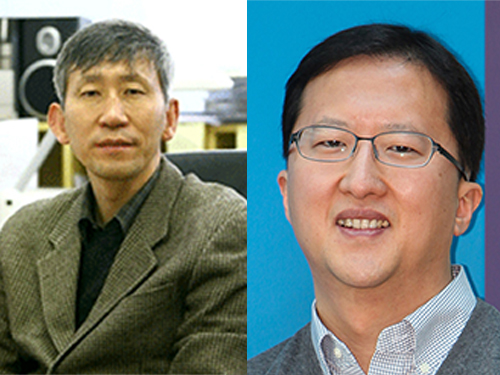 Professors Sukbok Chang and Jang-Wook Choi Receive the 2015 Knowledge Award from the Korean Government
The Ministry of Science, ICT and Future Planning (MISP) of the Republic of Korea announced the 2015 Knowledge Awards on October 20, 2015. Two KAIST professors received the award.
Established in 2009, the awards are presented to Korean scientists whose publications have contributed to the international science community. Specifically, the MISP used the two biggest science databases, Science Citation Index Expanded (SCIE) and Scopus, to identify ten highly cited papers ranked in the top 1% by total citations in the past ten years.
Professor Sukbok Chang of Chemistry (left in the picture below) is a global authority in the field of catalytic hydrocarbon functionalization. His paper entitled “Palladium-catalyzed C-H Functionalization of Pyridine N-Oxides: Highly Selective Alkenylation and Direct Arylation with Unactivated Arenes,” which was published in the Journal of the American Chemical Society in 2008, was once selected by Thomson Reuters as one of the “Most Influential Research Papers of the Month.” In 2011, the American Chemical Society included his paper in the list of the top 20 research papers that were most frequently cited in the last three years.
Professor Jang-Wook Choi of the Graduate School of EEWS (Energy, Environment, Water, and Sustainability) has been known for his leading research in rechargeable battery, supercapacitor, and materials chemistry. In particular, his work on secondary fuel cells attracted significant attention from academia and industry in Korea. Professor Choi developed a super-thin flexible lithium-ion battery this year, thinner than a credit card, which lasts longer than the existing batteries and with greater performance. He also developed new electrode materials for next-generation sodium-ion and magnesium secondary fuel cells.
Professor Sukbok Chang (left) and Professor Jang-Wook Choi (right)
2015.10.23 View 12877
Professors Sukbok Chang and Jang-Wook Choi Receive the 2015 Knowledge Award from the Korean Government
The Ministry of Science, ICT and Future Planning (MISP) of the Republic of Korea announced the 2015 Knowledge Awards on October 20, 2015. Two KAIST professors received the award.
Established in 2009, the awards are presented to Korean scientists whose publications have contributed to the international science community. Specifically, the MISP used the two biggest science databases, Science Citation Index Expanded (SCIE) and Scopus, to identify ten highly cited papers ranked in the top 1% by total citations in the past ten years.
Professor Sukbok Chang of Chemistry (left in the picture below) is a global authority in the field of catalytic hydrocarbon functionalization. His paper entitled “Palladium-catalyzed C-H Functionalization of Pyridine N-Oxides: Highly Selective Alkenylation and Direct Arylation with Unactivated Arenes,” which was published in the Journal of the American Chemical Society in 2008, was once selected by Thomson Reuters as one of the “Most Influential Research Papers of the Month.” In 2011, the American Chemical Society included his paper in the list of the top 20 research papers that were most frequently cited in the last three years.
Professor Jang-Wook Choi of the Graduate School of EEWS (Energy, Environment, Water, and Sustainability) has been known for his leading research in rechargeable battery, supercapacitor, and materials chemistry. In particular, his work on secondary fuel cells attracted significant attention from academia and industry in Korea. Professor Choi developed a super-thin flexible lithium-ion battery this year, thinner than a credit card, which lasts longer than the existing batteries and with greater performance. He also developed new electrode materials for next-generation sodium-ion and magnesium secondary fuel cells.
Professor Sukbok Chang (left) and Professor Jang-Wook Choi (right)
2015.10.23 View 12877 -
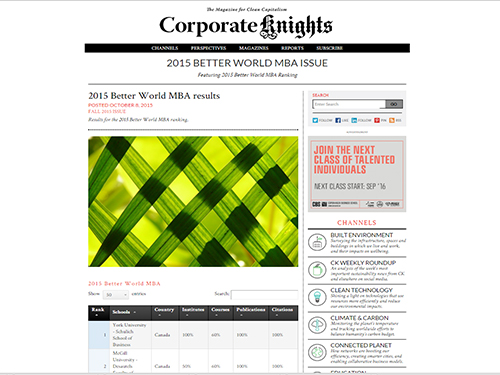 KAIST's College of Business Places Fourth in the 2015 Better World MBA Ranking
The Corporate Knights, a business and society magazine based in Canada, released the results of the 2015 Better World MBA Ranking on October 8, 2015.
KAIST’s business school ranked fourth globally and, number one in Asia, according to the list.
The 2015 Corporate Knights Better World MBA Ranking included a total of 121 schools; York University’s Schulich School of Business of Canada took first place.
The rankings were based on three criteria: the number of curricula (core and required courses) dedicated to sustainability, the number of research institutions and centers at the business school, and the volume of faculty research focused on better world topics such as sustainable finance, clean energy, or gender diversity.
The Better World MBA Ranking aims to identify business schools that best equip graduates who seek to change the world for the better by offering students opportunities to learn how to integrate social and environmental factors in their understanding of management functions via core MBA courses, faculty expertise, and research centers.
Dean Dong-Seok Kim of the College of Business at KAIST said,
“For years, our school has introduced a wide range of programs and research initiatives that address important social needs and issues. As part of this effort, we created the Graduate School of Green Growth and MBA for Social Entrepreneurship back in 2013. I believe that these endeavors played a favorable role in our receiving high scores in the ranking.”
KAIST’s Graduate School of Green Growth previously ranked sixth in the world’s top Green MBA School list published by Corporate Knights.
For the 2015 Better World MBA Ranking, go to
http://www.corporateknights.com/reports/2015-global-sustainable-mba/11153-14442629/.
2015.10.12 View 5738
KAIST's College of Business Places Fourth in the 2015 Better World MBA Ranking
The Corporate Knights, a business and society magazine based in Canada, released the results of the 2015 Better World MBA Ranking on October 8, 2015.
KAIST’s business school ranked fourth globally and, number one in Asia, according to the list.
The 2015 Corporate Knights Better World MBA Ranking included a total of 121 schools; York University’s Schulich School of Business of Canada took first place.
The rankings were based on three criteria: the number of curricula (core and required courses) dedicated to sustainability, the number of research institutions and centers at the business school, and the volume of faculty research focused on better world topics such as sustainable finance, clean energy, or gender diversity.
The Better World MBA Ranking aims to identify business schools that best equip graduates who seek to change the world for the better by offering students opportunities to learn how to integrate social and environmental factors in their understanding of management functions via core MBA courses, faculty expertise, and research centers.
Dean Dong-Seok Kim of the College of Business at KAIST said,
“For years, our school has introduced a wide range of programs and research initiatives that address important social needs and issues. As part of this effort, we created the Graduate School of Green Growth and MBA for Social Entrepreneurship back in 2013. I believe that these endeavors played a favorable role in our receiving high scores in the ranking.”
KAIST’s Graduate School of Green Growth previously ranked sixth in the world’s top Green MBA School list published by Corporate Knights.
For the 2015 Better World MBA Ranking, go to
http://www.corporateknights.com/reports/2015-global-sustainable-mba/11153-14442629/.
2015.10.12 View 5738 -
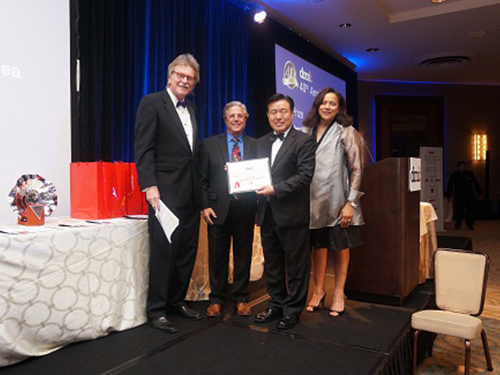 Professor Kyung-Won Chung Receives the 2015 Design Value Awards
The Design Management Institute (DMI) announced eleven winners of its 2015 Design Value Awards.
Professor Kyung-Won Chung of the Industrial Design Department at KAIST took one of the four First Place Design Value Awards. The award ceremony was held on September 28, 2015, at the Royal Sonesta Hotel in Boston.
DMI is an international organization that has actively advocated for the strategic value of design, sponsoring research, publishing academic papers, connecting members across disciplines and the globe, and sharing best design practices.
Commemorating its 40th anniversary, DMI created the inaugural Design Value Awards this year, which honors the contributions of design teams who have delivered significant value through design or design management practices.
There were four categories of the awards: first, second, and third prize, and Honorable Mention. The first place had four winners; both the second and third took two winners each. The honorable mention included three awardees.
The award noted Professor Chung's contributions to the development of design management theory and practices in Korea and his dedication to elevate KAIST’s industrial design department to one of the 30 leading design institutions in the world during his 30-year career at the university.
DMI also appointed Professor Chung a Life Fellow.
Professor Chung said,
“I am greatly honored to receive such a significant award, the equivalent of the Academy Awards in the field of design. I hope this award will encourage the further development of the Korean design industry to lead the global design community.”
He has served in various important positions in public and private organizations, including as the president of the Korea Institute of Design Promotion, Vice Mayor of Design for the City of Seoul, Advisor to the Design Division of Samsung Electronics, and a member of organizing committee of the International Council of Societies of Industrial Design.
2015.10.04 View 7829
Professor Kyung-Won Chung Receives the 2015 Design Value Awards
The Design Management Institute (DMI) announced eleven winners of its 2015 Design Value Awards.
Professor Kyung-Won Chung of the Industrial Design Department at KAIST took one of the four First Place Design Value Awards. The award ceremony was held on September 28, 2015, at the Royal Sonesta Hotel in Boston.
DMI is an international organization that has actively advocated for the strategic value of design, sponsoring research, publishing academic papers, connecting members across disciplines and the globe, and sharing best design practices.
Commemorating its 40th anniversary, DMI created the inaugural Design Value Awards this year, which honors the contributions of design teams who have delivered significant value through design or design management practices.
There were four categories of the awards: first, second, and third prize, and Honorable Mention. The first place had four winners; both the second and third took two winners each. The honorable mention included three awardees.
The award noted Professor Chung's contributions to the development of design management theory and practices in Korea and his dedication to elevate KAIST’s industrial design department to one of the 30 leading design institutions in the world during his 30-year career at the university.
DMI also appointed Professor Chung a Life Fellow.
Professor Chung said,
“I am greatly honored to receive such a significant award, the equivalent of the Academy Awards in the field of design. I hope this award will encourage the further development of the Korean design industry to lead the global design community.”
He has served in various important positions in public and private organizations, including as the president of the Korea Institute of Design Promotion, Vice Mayor of Design for the City of Seoul, Advisor to the Design Division of Samsung Electronics, and a member of organizing committee of the International Council of Societies of Industrial Design.
2015.10.04 View 7829 -
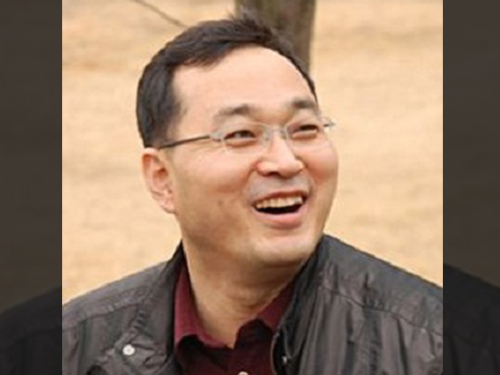 Professor Junehwa Song Appointed as the General Chair of the Organizing Committee of ACM SenSys
Professor Junehwa Song from the Schooling of Computing at KAIST has been appointed the general chair of the organizing committee of ACM SenSys—the American Computing Machine (ACM) Conference on Embedded Networked Sensor Systems.
ACM SenSys held its first conference in 2003 to promote research on wireless sensor networks and embedded systems. Since then, it has expanded into an influential international conference especially with the increasing importance in sensor technologies. Recently the committee has expanded its field of interest to mobile sensors, the Internet of Things, smart device system, and security.
Professor Song is considered a world-renown researcher in mobile and ubiquitous computing system. He presented numerous research papers at various conferences organized by ACM. He is also a member of the editorial committee of the Institute of Electrical and Electronics Engineers (IEEE) Transactions on Mobile Computing journal. For his achievements in the field and flair for coordinating and planning conferences, he is now the first Korean researcher to be appointed the chair of ACM SenSys.
Professor Song said that, as the chair, he would help discover new technology in and applications of networked, wireless sensors that would meet the demands of our modern society.
The 13th ACM SenSys will take place in Seoul—the first one to be held in Asia. The event will begin on November 1, 2015 and last four days. More information about this year’s event can be found at http://sensys.acm.org/2015/.
2015.10.02 View 8235
Professor Junehwa Song Appointed as the General Chair of the Organizing Committee of ACM SenSys
Professor Junehwa Song from the Schooling of Computing at KAIST has been appointed the general chair of the organizing committee of ACM SenSys—the American Computing Machine (ACM) Conference on Embedded Networked Sensor Systems.
ACM SenSys held its first conference in 2003 to promote research on wireless sensor networks and embedded systems. Since then, it has expanded into an influential international conference especially with the increasing importance in sensor technologies. Recently the committee has expanded its field of interest to mobile sensors, the Internet of Things, smart device system, and security.
Professor Song is considered a world-renown researcher in mobile and ubiquitous computing system. He presented numerous research papers at various conferences organized by ACM. He is also a member of the editorial committee of the Institute of Electrical and Electronics Engineers (IEEE) Transactions on Mobile Computing journal. For his achievements in the field and flair for coordinating and planning conferences, he is now the first Korean researcher to be appointed the chair of ACM SenSys.
Professor Song said that, as the chair, he would help discover new technology in and applications of networked, wireless sensors that would meet the demands of our modern society.
The 13th ACM SenSys will take place in Seoul—the first one to be held in Asia. The event will begin on November 1, 2015 and last four days. More information about this year’s event can be found at http://sensys.acm.org/2015/.
2015.10.02 View 8235 -
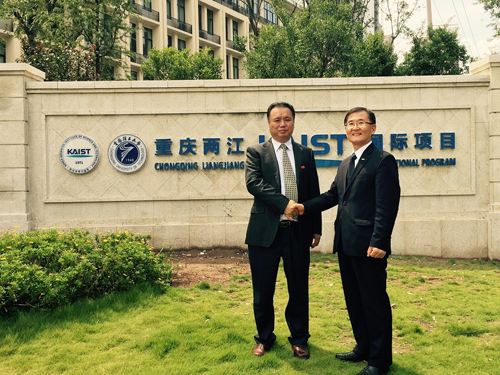 KAIST and Chongqing University of Technology in China Open an International Program
With the help of KAIST, Chongqing University of Technology (CQUT) in China established an electrical engineering and computer science program and admitted their first 66 freshmen this fall semester.
The joint program was created to foster skilled engineers in the fields of electrical engineering and computer science, which are necessary for the development of the Korean and Chinese Industrial Complex located in Chongqing City.
KAIST has provided CQUT with a majority of the program’s curricula currently offered to its students in Daejeon, Korea.
Under the jointly administered program, KAIST takes on education and research while CQUT is responsible for student selection and administration.
KAIST has dispatched eight professors to teach the related fields in English, and 17 CQUT professors will teach the rest of the curricula.
In August 2014, KAIST and CQUT singed a cooperation agreement for education and research exchange and created the CQUT-KAIST Education Cooperation Center, which is headed by Professor Young-Nam Han of the Electrical Engineering Department at KAIST.
The two universities will expand their collaboration to include graduate programs by 2016.
In the picture below, President Steve Kang of KAIST (right) shakes hands with President Shi Xiaohui of Chongqing University of Technology (left).
2015.09.17 View 11394
KAIST and Chongqing University of Technology in China Open an International Program
With the help of KAIST, Chongqing University of Technology (CQUT) in China established an electrical engineering and computer science program and admitted their first 66 freshmen this fall semester.
The joint program was created to foster skilled engineers in the fields of electrical engineering and computer science, which are necessary for the development of the Korean and Chinese Industrial Complex located in Chongqing City.
KAIST has provided CQUT with a majority of the program’s curricula currently offered to its students in Daejeon, Korea.
Under the jointly administered program, KAIST takes on education and research while CQUT is responsible for student selection and administration.
KAIST has dispatched eight professors to teach the related fields in English, and 17 CQUT professors will teach the rest of the curricula.
In August 2014, KAIST and CQUT singed a cooperation agreement for education and research exchange and created the CQUT-KAIST Education Cooperation Center, which is headed by Professor Young-Nam Han of the Electrical Engineering Department at KAIST.
The two universities will expand their collaboration to include graduate programs by 2016.
In the picture below, President Steve Kang of KAIST (right) shakes hands with President Shi Xiaohui of Chongqing University of Technology (left).
2015.09.17 View 11394 -
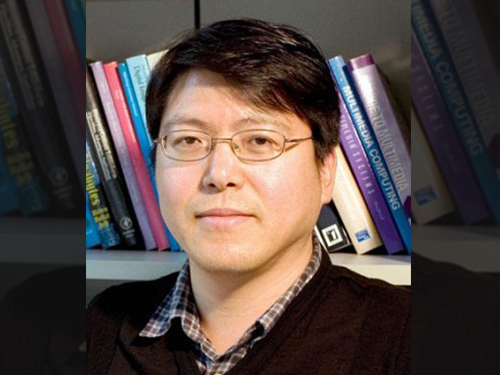 Professor Woontack Woo Demonstrates an Optical Platform Technology for Augmented Reality at Smart Cloud Show
Professor Woontack Woo of the Graduate School of Culture Technology at KAIST participated in the Smart Cloud Show, a technology exhibition, hosted by the university’s Augmented Human Research Center and presented the latest development of his research, an optical platform system for augmented reality.
This event took place on September 16-17, 2015 at Grand Seoul Nine Tree Convention Center in Seoul.
At the event, Professor Woo introduced a smart glass with an embedded augmented reality system, which permits remote collaboration between an avatar and the user’s hand.
The previous remote collaboration was difficult for ordinary users to employ because of its two-dimensional screen and complicated virtual reality system.
However, with the new technology, the camera attached to artificial reality (AR) glasses recognizes the user’s hand and tracks it down to collaborate. The avatar in the virtual space and the user’s hand interact in real space and time.
The key to this technology is the stable, real-time hand-tracking technique that allows the detection of the hand’s locations and the recognition of finger movements even in situations of self-occlusion.
Through this method, a user can touch and manipulate augmented contents as if they were real-life objects, thereby collaborating remotely with another user who is physically distant by linking his or her movements with an avatar.
If this technology is adopted widely, it may bring some economic benefits such as increased productivity due to lower costs for mobility and reduction in social overhead costs from the decrease in the need of traveling long distance.
Professor Woo said, “This technology will provide us with a greater opportunity for collaboration, not necessarily restricted to physical travelling, which can be widely used in the fields of medicine, education, entertainment, and tourism.”
Professor Woo plans to present his research results on hand-movement tracking and detection at the 12th International Conference on Ubiquitous Robots and Ambient Intelligence (URAI 2015), to be held on October 28-30, 2015, at Kintex in Goyang, Korea.
He will also present a research paper on remote collaboration at the ICAT-EGVE 2015 conference, the merger of the 25th International Conference on Artificial Reality and Telexistence (ICAT 2015) and the 20th Eurographics Symposium on Virtual Environments (EGVE 2015), which will take place on October 28-30, 2015 at the Kyoto International Community House, Kyoto, Japan.
2015.09.16 View 9793
Professor Woontack Woo Demonstrates an Optical Platform Technology for Augmented Reality at Smart Cloud Show
Professor Woontack Woo of the Graduate School of Culture Technology at KAIST participated in the Smart Cloud Show, a technology exhibition, hosted by the university’s Augmented Human Research Center and presented the latest development of his research, an optical platform system for augmented reality.
This event took place on September 16-17, 2015 at Grand Seoul Nine Tree Convention Center in Seoul.
At the event, Professor Woo introduced a smart glass with an embedded augmented reality system, which permits remote collaboration between an avatar and the user’s hand.
The previous remote collaboration was difficult for ordinary users to employ because of its two-dimensional screen and complicated virtual reality system.
However, with the new technology, the camera attached to artificial reality (AR) glasses recognizes the user’s hand and tracks it down to collaborate. The avatar in the virtual space and the user’s hand interact in real space and time.
The key to this technology is the stable, real-time hand-tracking technique that allows the detection of the hand’s locations and the recognition of finger movements even in situations of self-occlusion.
Through this method, a user can touch and manipulate augmented contents as if they were real-life objects, thereby collaborating remotely with another user who is physically distant by linking his or her movements with an avatar.
If this technology is adopted widely, it may bring some economic benefits such as increased productivity due to lower costs for mobility and reduction in social overhead costs from the decrease in the need of traveling long distance.
Professor Woo said, “This technology will provide us with a greater opportunity for collaboration, not necessarily restricted to physical travelling, which can be widely used in the fields of medicine, education, entertainment, and tourism.”
Professor Woo plans to present his research results on hand-movement tracking and detection at the 12th International Conference on Ubiquitous Robots and Ambient Intelligence (URAI 2015), to be held on October 28-30, 2015, at Kintex in Goyang, Korea.
He will also present a research paper on remote collaboration at the ICAT-EGVE 2015 conference, the merger of the 25th International Conference on Artificial Reality and Telexistence (ICAT 2015) and the 20th Eurographics Symposium on Virtual Environments (EGVE 2015), which will take place on October 28-30, 2015 at the Kyoto International Community House, Kyoto, Japan.
2015.09.16 View 9793 -
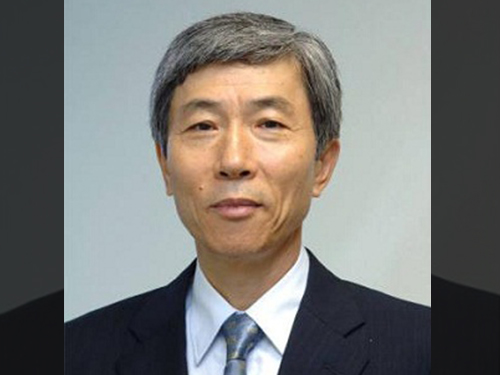 Professor Seok-Jung Kang Is Appointed the Director of the Korea Institute of Ceramic Engineering and Technology
Professor Seok-Jung Kang of the Material Sciences and Engineering Department at KAIST has been appointed to the position of the third Director of the Korea Institute of Ceramic Engineering and Technology. His three-year term will begin September 9, 2015.
An authority in the field of ceramics, Professor Kang has taught at KAIST since 1980. He received his bachelor’s degree from the Department of Metallurgical Engineering at Seoul National University, his master’s degree at KAIST, and his doctoral degree at the Ecole Centrale de Paris.
Professor Kang received the Robert B. Sosman Award in 2011, an annual prize given by the American Society of Ceramics to recognize outstanding achievement in basic science in an area that results in significant impact to the field of ceramics. He was the first Asian recipient of the award.
He also received the 2015 Professor Sir Richard Brooke Award, a prestigious bi-annual prize presented to an outstanding scholar by the European Society of Ceramics.
2015.09.15 View 7071
Professor Seok-Jung Kang Is Appointed the Director of the Korea Institute of Ceramic Engineering and Technology
Professor Seok-Jung Kang of the Material Sciences and Engineering Department at KAIST has been appointed to the position of the third Director of the Korea Institute of Ceramic Engineering and Technology. His three-year term will begin September 9, 2015.
An authority in the field of ceramics, Professor Kang has taught at KAIST since 1980. He received his bachelor’s degree from the Department of Metallurgical Engineering at Seoul National University, his master’s degree at KAIST, and his doctoral degree at the Ecole Centrale de Paris.
Professor Kang received the Robert B. Sosman Award in 2011, an annual prize given by the American Society of Ceramics to recognize outstanding achievement in basic science in an area that results in significant impact to the field of ceramics. He was the first Asian recipient of the award.
He also received the 2015 Professor Sir Richard Brooke Award, a prestigious bi-annual prize presented to an outstanding scholar by the European Society of Ceramics.
2015.09.15 View 7071 -
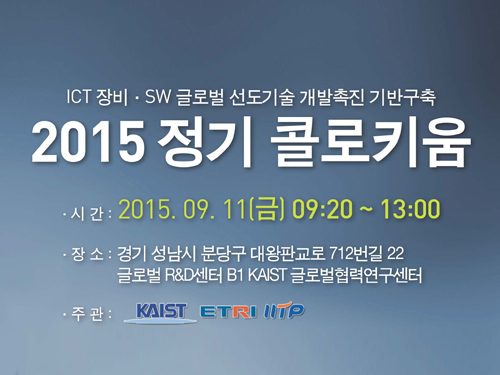 KAIST to Hold a Colloquium on the Internet of Things and Open Stack
With the support of the Ministry of Science, ICT, and Future Planning of Korea, KAIST hosted a colloquium on the Internet of Things (IoT) and Open Stack at the KAIST Research Center for Global Cooperation located in Pangyo. The upcoming event was organized to provide an overview of the technological trends to IT companies and foster their success in the global market.
The colloquium invited numerous field-experts as speakers and discussed the influence of IoT and OpenStack on the small- and medium-sized companies in Korea.
Professor Gwan-Hoo Lee from the American University joined as a speaker and shared his insights of how IoT would change the global business environment. He introduced various business models developed by Microsoft, Intel, Apple, Google, and Cisco and discussed how Korean companies could utilize the existing tools and strategy to succeed in the global market. His talk focused specifically on the importance of overseas partnerships and technology stack analysis.
President Hyun-Jung Jang from the Korean OpenStack Community also gave a speech on global partnership through OpenStack. He discussed the future trends of OpenStack and why companies should invest in the field.
KAIST used the event as an opportunity to provide information to domestic companies that are interested in building partnerships with overseas companies and in developing new IoT and OpenStack technology.
More information about the event can be provided online at www.ictc.or.kr.
2015.09.11 View 5716
KAIST to Hold a Colloquium on the Internet of Things and Open Stack
With the support of the Ministry of Science, ICT, and Future Planning of Korea, KAIST hosted a colloquium on the Internet of Things (IoT) and Open Stack at the KAIST Research Center for Global Cooperation located in Pangyo. The upcoming event was organized to provide an overview of the technological trends to IT companies and foster their success in the global market.
The colloquium invited numerous field-experts as speakers and discussed the influence of IoT and OpenStack on the small- and medium-sized companies in Korea.
Professor Gwan-Hoo Lee from the American University joined as a speaker and shared his insights of how IoT would change the global business environment. He introduced various business models developed by Microsoft, Intel, Apple, Google, and Cisco and discussed how Korean companies could utilize the existing tools and strategy to succeed in the global market. His talk focused specifically on the importance of overseas partnerships and technology stack analysis.
President Hyun-Jung Jang from the Korean OpenStack Community also gave a speech on global partnership through OpenStack. He discussed the future trends of OpenStack and why companies should invest in the field.
KAIST used the event as an opportunity to provide information to domestic companies that are interested in building partnerships with overseas companies and in developing new IoT and OpenStack technology.
More information about the event can be provided online at www.ictc.or.kr.
2015.09.11 View 5716 -
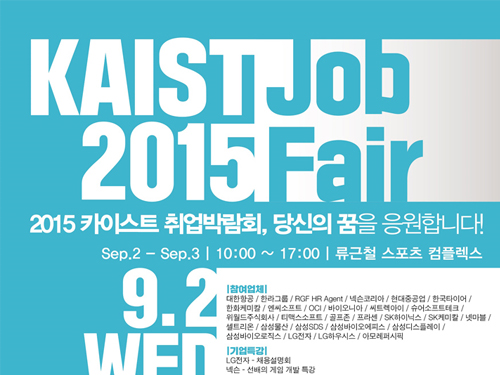 KAIST's Student Job Fair 2015
KAIST’s Undergraduate Student Council and Graduate Student Council jointly hosted the 2015 KAIST Job Fair on September 2-3, 2015 at the Sports Complex on campus.
The Job Fair took place for the sixth time this year. Forty-three companies, including some of the largest ones in Korea such as Samsung, Hyundai, LG, SK Construction, Hankook Tires, as well as those owned by KAIST graduates, have participated.
The Job Fair specialized in three fields: information technology (IT) and electronic and mechanical engineering. The event included one-to-one employment counseling between human resources managers and students, mock interviews, employment orientations, job consulting, interview makeup lessons, resume writing and photo-shooting, etc.
The international students who attended the event received information packages on employment from the participating companies.
This event was open not only to KAIST students but also to students from other universities in the local community, offering more job opportunities to a wider range of people.
Last year alone, a total of 1,200 people including KAIST students and graduates joined the KAIST’s Job Fair.
2015.09.04 View 6888
KAIST's Student Job Fair 2015
KAIST’s Undergraduate Student Council and Graduate Student Council jointly hosted the 2015 KAIST Job Fair on September 2-3, 2015 at the Sports Complex on campus.
The Job Fair took place for the sixth time this year. Forty-three companies, including some of the largest ones in Korea such as Samsung, Hyundai, LG, SK Construction, Hankook Tires, as well as those owned by KAIST graduates, have participated.
The Job Fair specialized in three fields: information technology (IT) and electronic and mechanical engineering. The event included one-to-one employment counseling between human resources managers and students, mock interviews, employment orientations, job consulting, interview makeup lessons, resume writing and photo-shooting, etc.
The international students who attended the event received information packages on employment from the participating companies.
This event was open not only to KAIST students but also to students from other universities in the local community, offering more job opportunities to a wider range of people.
Last year alone, a total of 1,200 people including KAIST students and graduates joined the KAIST’s Job Fair.
2015.09.04 View 6888 -
 KAIST's Research Team Receives the Best Paper Award from the IEEE Transaction on Power Electronics
A research team led by Professor Chun T. Rim of the Department of Nuclear and Quantum Engineering at the Korea Advanced Institute of Science and Technology (KAIST) has received the First Prize Papers Award from the IEEE (Institute of Electrical and Electronics Engineers) Transactions on Power Electronics (TPEL), a peer-reviewed journal that covers fundamental technologies used in the control and conversion of electric power.
A total of three research papers received this award in 2015.
Each year, TPEL’s editors select three best papers among those published in the journal during the preceding calendar year. In 2014, the TPEL published 579 papers. Professor Rim’s paper was picked out as one of the three papers published last year for the First Prize Papers Award.
Entitled “Generalized Active EMF (electromagnetic field) Cancel Methods for Wireless Electric Vehicles (http://ieeexplore.ieee.org/xpls/abs_all.jsp?arnumber=6684288&tag=1),” the paper proposed, for the first time in the world, three generalized design methods for cancelling the total EMF generated from wireless electric vehicles. This technology, researchers said, can be applied to any wireless power transfer systems.
The award ceremony will be held at the upcoming conference of the 2015 IEEE Energy Conversion Congress and Expo in September in Montreal, Canada.
2015.08.27 View 11395
KAIST's Research Team Receives the Best Paper Award from the IEEE Transaction on Power Electronics
A research team led by Professor Chun T. Rim of the Department of Nuclear and Quantum Engineering at the Korea Advanced Institute of Science and Technology (KAIST) has received the First Prize Papers Award from the IEEE (Institute of Electrical and Electronics Engineers) Transactions on Power Electronics (TPEL), a peer-reviewed journal that covers fundamental technologies used in the control and conversion of electric power.
A total of three research papers received this award in 2015.
Each year, TPEL’s editors select three best papers among those published in the journal during the preceding calendar year. In 2014, the TPEL published 579 papers. Professor Rim’s paper was picked out as one of the three papers published last year for the First Prize Papers Award.
Entitled “Generalized Active EMF (electromagnetic field) Cancel Methods for Wireless Electric Vehicles (http://ieeexplore.ieee.org/xpls/abs_all.jsp?arnumber=6684288&tag=1),” the paper proposed, for the first time in the world, three generalized design methods for cancelling the total EMF generated from wireless electric vehicles. This technology, researchers said, can be applied to any wireless power transfer systems.
The award ceremony will be held at the upcoming conference of the 2015 IEEE Energy Conversion Congress and Expo in September in Montreal, Canada.
2015.08.27 View 11395 -
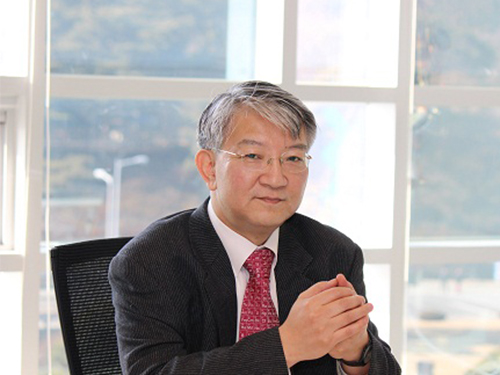 Nature Biotechnology Nominates Sang Yup Lee of KAIST for Top 20 Translational Researchers of 2014
Nature Biotechnology, recognized as the most prestigious journal in the field of biotechnology, has released today its list of the Top 20 Translational Researchers of 2014. Distinguished Professor Sang Yup Lee of the Department of Chemical and Biomolecular Engineering at KAIST (Korea Advanced Institute of Science and Technology) ranked seventh in the list. He is the only Asian researcher listed.
The journal, in partnership with IP Checkups, a patent analytics firm, presents an annual ranking of researchers based on their paper and patent output. The list includes, among others, each researcher’s most-cited patent in the past five years and their H index, a measurement to evaluate the impact of a researcher’s published work utilizing citation analysis. (More details can be found at http://www.nature.com/bioent/2015/150801/full/bioe.2015.9.html.)
American institutions made up the majority of the list, with 18 universities and research institutes, and the remainder was filled by KAIST in Korea and the Commonwealth Scientific and Industrial Research Organization (CSIRO) in Australia.
Globally known as a leading researcher in systems metabolic engineering, Professor Lee has published more than 500 journal papers and 580 patents. He has received many awards, including the Citation Classic Award, Elmer Gaden Award, Merck Metabolic Engineering Award, ACS Marvin Johnson Award, SIMB Charles Thom Award, POSCO TJ Park Prize, Amgen Biochemical Engineering Award, and the Ho Am Prize in Engineering.
2015.08.27 View 11284
Nature Biotechnology Nominates Sang Yup Lee of KAIST for Top 20 Translational Researchers of 2014
Nature Biotechnology, recognized as the most prestigious journal in the field of biotechnology, has released today its list of the Top 20 Translational Researchers of 2014. Distinguished Professor Sang Yup Lee of the Department of Chemical and Biomolecular Engineering at KAIST (Korea Advanced Institute of Science and Technology) ranked seventh in the list. He is the only Asian researcher listed.
The journal, in partnership with IP Checkups, a patent analytics firm, presents an annual ranking of researchers based on their paper and patent output. The list includes, among others, each researcher’s most-cited patent in the past five years and their H index, a measurement to evaluate the impact of a researcher’s published work utilizing citation analysis. (More details can be found at http://www.nature.com/bioent/2015/150801/full/bioe.2015.9.html.)
American institutions made up the majority of the list, with 18 universities and research institutes, and the remainder was filled by KAIST in Korea and the Commonwealth Scientific and Industrial Research Organization (CSIRO) in Australia.
Globally known as a leading researcher in systems metabolic engineering, Professor Lee has published more than 500 journal papers and 580 patents. He has received many awards, including the Citation Classic Award, Elmer Gaden Award, Merck Metabolic Engineering Award, ACS Marvin Johnson Award, SIMB Charles Thom Award, POSCO TJ Park Prize, Amgen Biochemical Engineering Award, and the Ho Am Prize in Engineering.
2015.08.27 View 11284